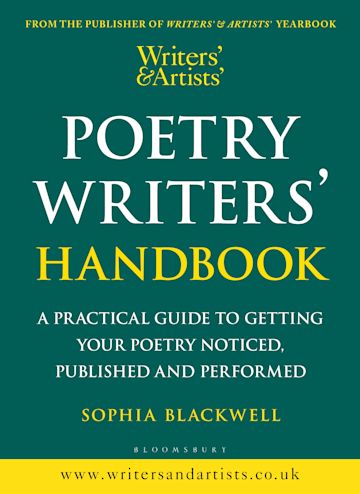In this modified extract from the Poetry Writers' Handbook, author Sophia Blackwell talks about the process of learning to let go and the realities of sharing your words with the world.

Poems often feel quite magical and come to us in moments of joy, grief or crisis. Often a poet will say that they don’t know where a poem came from, or that they felt like a conduit that the poem flowed through. While most poets would completely recognise these sentiments, the idea of the poem as magic can be dangerous. It might make you feel as though you have no agency over whether you write another poem as good. You might worry that sharing or explaining the poem will diminish its power. You might decide that because the poem came to you as a gift, it is perfect and requires no improvement. This is very rarely the case, but I do think poetry is an act of faith, an act of repeatedly admitting that you don’t know what you’re doing. Your last poem has nothing to do with the one you’ve just started writing. Isn’t that scary – and liberating?
It’s not just poets who talk about poetry in these terms. Critics, marketers, publishers, publicists and prize committees perpetuate the idea of the private poem by focusing on the rawness and authenticity of what’s being expressed. In my corner of the poetry world, the spoken word community, poems are judged (sometimes literally, if you’re at a poetry Slam) by how well the poet seems to have conveyed exactly what’s inside them. The same is often true for page poets, who are praised for being ‘real’ or penalised, sometimes deservedly, for writing from a point of view or background when they lack personal experience of it.
The idea of ‘working as a poet’ – clocking in and out every day or toiling away in the way that Anthony Trollope would have done on poems often feel quite magical and come to us in moments of joy, grief his novels – isn’t exactly a contradiction, but it does sit oddly with the mystery of poetry, its urgent and specific nature. The idea of a poem as a unique, magical thing doesn’t sit well with the concept of the daily grind, but you do have to work at your art and start by making space for it. Like a musician, you’re more likely to make the most of this moment of inspiration if you have done your hours of practice.
You can make more of a moment’s inspiration if your writing muscles are exercised and your mind is primed to receive it. Ways you might get yourself ready include reading other people’s writing, trying new poetry exercises, and seeking out different types of art at exhibitions, in books or online. There’s a lot of work in being a poet, whether you’re keeping spreadsheets of magazines you’ve submitted work to, memorising your poetry in front of a mirror or setting off on another train journey home with unsold books in your bag. The moments of magic come in publication and performance, seeing your name on a page or hearing the audience genuinely applaud for you, and these moments help you reconnect with the poem. Making your poem public might feel like you’re pushing it further away from the act of composition, but I’ve always felt like it can be a shortcut back to the moment of private magic when you wrote it, particularly if you are giving a spoken word performance.
 As your poem makes its way out into the world, the poem becomes both more and less your own. This is something that feels like another contradiction, but it’s just something else to navigate. Only you can write the poem, but it starts to exist properly and gains a fuller, richer life when other people and their perspectives come into the picture and interact with the poem. As soon as you publish or perform it, it has a life outside that moment of inspiration. It becomes a public poem, and you become a public poet.
As your poem makes its way out into the world, the poem becomes both more and less your own. This is something that feels like another contradiction, but it’s just something else to navigate. Only you can write the poem, but it starts to exist properly and gains a fuller, richer life when other people and their perspectives come into the picture and interact with the poem. As soon as you publish or perform it, it has a life outside that moment of inspiration. It becomes a public poem, and you become a public poet.
Like the magic of poetry and the mundanity of working at it, it feels like there is a difference between the private business of creating art and the public business of performing it. Some people cope better with this than others, but even for extroverts, it can be disorienting to move from sitting around on your own in your pyjamas making things up, or polishing a single line for hours, to the business of trying to get the general public to buy your writing. Given that other people are going to get involved in your writing anyway, your challenge is finding the right other people.
This article is an abridged extract from the Poetry Writers' Handbook, available to order at Bloomsbury.com.
Sophia Blackwell is a performance poet with three published collections of poetry and the author of a novel. Her poetry has been anthologised by Bloodaxe, Nine Arches and the Emma Press among others, and between Autumn 2019 and and 2021, she hosted the LGBT+ radio show Out in South London on Resonance FM, showcasing gay, lesbian, bisexual and trans authors, musicians, comedians and other creatives like her.
Recent notable gigs include four times at Glastonbury on the Poetry & Words Stage, Women of the World (WOW) Festival at the South Bank Centre and headlining a national tour with Hammer and Tongue. She is a Literary Death Match champion, Spread the Word LGBT Hero and Diversity Role Model. She was the Former Chair of Poetry London and is a freelance editor and the current Chair of the Pride Network at Hachette UK.
Comments